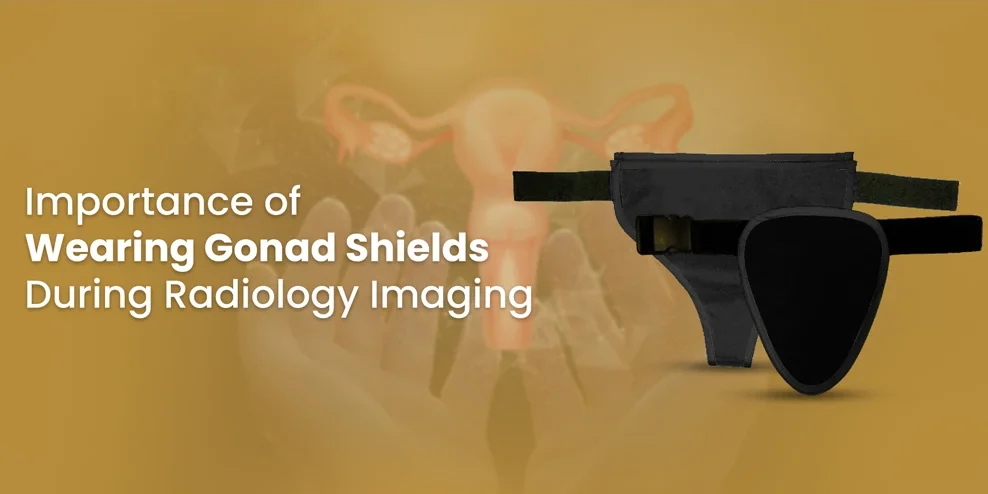Radiology imaging, including X-rays and CT scans can cause significant health risks, particularly to the reproductive organs. The gonads (testes in males and ovaries in females) are highly sensitive to radiation, making it essential to use protective measures such as gonad shields.
Radiation Risks- Causing Testicular Cancer and Infertility
-
Testicular Cancer:
Radiation exposure is a known risk factor for developing testicular cancer. The testes are particularly vulnerable to the harmful effects of ionizing radiation due to their high rate of cell division. Even low doses of radiation can induce genetic mutations in the cells, potentially leading to cancerous growths. Studies have shown a correlation between radiation exposure and an increased incidence of testicular cancer, particularly in young men. This makes it imperative to minimize radiation exposure to the testes during medical imaging procedures. -
Infertility:
Radiation can also have a detrimental impact on male fertility. The testes are responsible for producing sperm, which are highly sensitive to radiation. Exposure to ionizing radiation can damage the DNA in sperm cells, leading to reduced sperm count, impaired sperm motility, and increased rates of abnormal sperm. These factors can significantly decrease a man's fertility, making it difficult for him to father children. Additionally, radiation-induced damage to the testes can lead to hormonal imbalances, further affecting reproductive health.
Benefits of Gonad Shields
Gonad shields are protective devices designed to cover the reproductive organs during radiological procedures. Their use provides several crucial benefits:
-
Protection Against Radiation:
Gonad shields act as a barrier, absorbing and deflecting a significant portion of the ionizing radiation away from the sensitive gonadal tissue. This reduces the risk of radiation-induced genetic mutations and damage, thereby lowering the chances of developing testicular cancer. -
Preservation of Fertility:
By minimizing radiation exposure to the testes, gonad shields help protect sperm cells from damage. This preservation of healthy sperm is essential for maintaining male fertility and ensuring the possibility of fathering children in the future. -
Hormonal Health:
Shielding the testes from radiation also helps maintain normal hormonal function. The testes produce testosterone, a hormone crucial for various bodily functions, including muscle mass, bone density, and sexual health. Protecting the testes ensures the continued production of this vital hormone. -
Compliance with Safety Standards:
The use of gonad shields is recommended by various health and safety organizations, including the International Commission on Radiological Protection (ICRP) and the American College of Radiology (ACR). Adhering to these guidelines ensures that radiology practices meet the highest standards of patient care and safety. -
Patient Confidence and Trust:
Utilizing gonad shields establishes a commitment to patient safety and well-being. This practice can enhance patient confidence and trust in the medical imaging process, knowing that every precaution is being taken to protect their reproductive health.
Why Doctors Must Wear Gonad Shields?
While the primary focus is on protecting patients, doctors and radiology technicians should also wear gonad shields when they are in close proximity to radiation sources. Here are the key reasons:
-
Occupational Safety:
Radiologists and technicians are frequently exposed to ionizing radiation as part of their job. Repeated exposure, even in low doses, can accumulate over time and increase the risk of reproductive health issues, including cancer and infertility. Wearing gonad shields helps mitigate this risk. -
Setting an Example:
By wearing protective equipment themselves, doctors and technicians set a positive example for patients. This practice reinforces the importance of radiation safety and encourages patients to comply with protective measures. -
Regulatory Compliance:
Occupational health and safety regulations often mandate the use of protective gear for medical personnel working with radiation. Compliance with these regulations ensures a safe working environment and protects healthcare providers from potential health hazards. -
Long-Term Health:
Protecting their own reproductive health allows doctors and technicians to maintain their overall well-being and quality of life. This is particularly important for those planning to have children in the future.
The use of gonad shields during radiology imaging is crucial for protecting both patients and doctors from the harmful effects of ionizing radiation.







